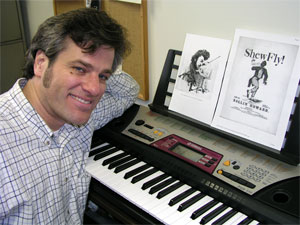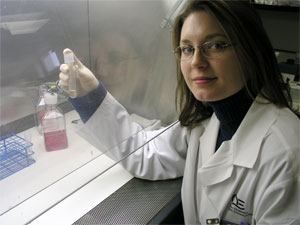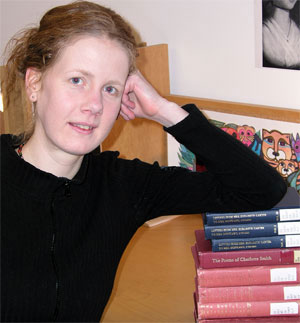November 22, 2004
Killam Scholars and Fellows
Dal's best and brightest minds
The birth of pop culture, women and doctors in the 18th century, more effective internet searching and genetic diseases - just a few of the research topics HÂþ»'s Killam scholars and fellows are studying.
In Canada, the word "Killam" means as much as the words "Nobel" or "Rhodes" throughout the world. HÂþ» is one of four Canadian universities to award the prestigious Killam scholarships and fellowships, which support academic excellence and meaningful research in every discipline. Earlier this month, HÂþ»'s 95 new and continuing Killam scholars and fellows were honoured at the annual Killam dinner. Some of the brightest minds at HÂþ», these graduate students and postdoctoral researchers certainly live up to the reputation of the awards they hold. Speaking to several of them, it's clear that the awards mean a lot more than just financial assistance.      ÂÂ
Jane Tougas of Belmont, Nova Scotia, is a new Killam predoctoral scholar working towards a Masters in Computer Science. She's bringing together her interests in numerical linear algebra and information retrieval to research new methods that make internet searching and electronic information retrieval more efficient. To her, the Killam scholarship is supporting new opportunities to collaborate with her peers through a research group, but it goes a lot further than that.       ÂÂ
"I'm a mature student with a family, and a three-hour round trip commute to school. It would be impossible for me to do my graduate degree without a scholarship," she says. "But it also gives me a sense that I'm on the right path- when the going gets tough, having the Killam scholarship is like having a little voice beside you saying 'You can do it!'"       ÂÂ
 | ||
| Steven Baur shows off the sheet music cover for the controversial 19th century pop hit, "Shew fly." (Kristen Loyst) | ||
For Steven Baur, his continuing Killam postdoctoral fellowship is bringing his research in music history to life. Coming to HÂþ» from UCLA last year, Baur examines the role of musical forms like the waltz and minstrel shows in the birth of popular culture and the social transformation of the United States between 1860 and 1880. "Music reflects and shapes vital social issues around things like race, class and gender," he says. "By studying the music of this period, we can learn a lot about where our popular culture comes from, and what it means."       ÂÂ
Baur hopes to publish a book on his research topic soon. "The Killam fellowship has allowed me to focus on my research. It's great for any researcher to have such a generous period of time to do your work," he says.      ÂÂ
 | ||
| Nisa Renault examines cell cultures that may help explain hemophilia in women.(Kristen Loyst) | ||
Studying human genetic diseases is the main focus of Nisa Renault's research for her Masters of Science degree in Pathology. This Halifax native and new Killam predoctoral scholar says that earning the Killam scholarship will help her now, and in the future. "I was very excited when I found out I would receive the award. For the future, this is great for my C.V., and I think it will help if I want to pursue another degree, or apply for other research projects."       ÂÂ
The scholarship is supporting her as she attempts to pinpoint a mutated gene that may contribute to the rare emergence of hemophilia in women. "I'm working with a family where several females are affected by the disease, which is unusual, because it usually affects males," she says. "In the future, this may help find a way to correct the problem, but in the meantime, we're helping the family by providing an explanation of what the problem is."
 | ||
| Heather Meek with her research tools, volumes of women's letters and journals from the 18th century.(Kristen Loyst) | ||
Heather Meek of Halifax has an eye to improving the interaction between doctors and patients today, by examining written material from the 18th century. Now in her third and final year as a Killam scholar, she's completing her PhD in English. Her research involves comparing descriptions of illness found in women's personal journals and letters written in the 18th century to the medical textbooks of that era. "I hope that my project will emphasize the importance of the patient's experience during medical treatments," she says.      ÂÂ
According to Meek, one of the major benefits of earning the Killam scholarship is the sense of community that comes with it. "Often, a feeling of isolation can come from this type of research. The Killam scholarship makes me feel that my research is valuable, and that I'm part of a real research community at Dal."       ÂÂ
The Killam scholarships and fellowships are granted through a trust established by Dorothy Killam, in memory of her husband, Nova Scotia-born businessman Izaak Walton Killam.
